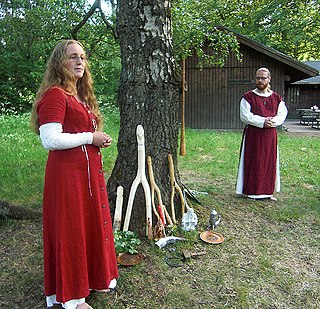Fashion is a form of self-expression and autonomy at a particular period and place and in a specific context, of clothing, footwear, lifestyle, accessories, makeup, hairstyle, and body posture. The term implies a look defined by the fashion industry as that which is trending. Everything that is considered fashion is available and popularized by the fashion system.

Svenska Dagbladet, abbreviated SvD, is a daily newspaper published in Stockholm, Sweden.

The Moderate Party, commonly referred to as the Moderates, is a liberal-conservative political party in Sweden. The party generally supports tax cuts, the free market, civil liberties and economic liberalism. Internationally, it is a full member of the International Democrat Union and the European People's Party.

John Fredrik Reinfeldt is a Swedish economist, lecturer, former Prime Minister of Sweden from 2006 to 2014 and chairman of the liberal conservative Moderate Party from 2003 to 2015. He was the last rotating President of the European Council in 2009. He is chairman of the Swedish Football Association since 25 March 2023.
Fashion law is a specific field of law that deals with legal issues that impact the fashion industry. Fundamental issues in fashion law include intellectual property, business and finance, with subcategories ranging from employment and labor law to real estate, international trade and government regulation. Fashion law also includes related areas such as textile production, modeling, media, cosmetics and perfume industries, questions of safety and sustainability, dress codes and religious apparel, consumer culture, privacy and wearable tech, and civil rights.
Anti-consumerism is a sociopolitical ideology that is opposed to consumerism, the continual buying and consuming of material possessions. Anti-consumerism is concerned with the private actions of business corporations in pursuit of financial and economic goals at the expense of the public welfare, especially in matters of environmental protection, social stratification, and ethics in the governing of a society. In politics, anti-consumerism overlaps with environmental activism, anti-globalization, and animal-rights activism; moreover, a conceptual variation of anti-consumerism is post-consumerism, living in a material way that transcends consumerism.
Standby power, also called vampire power, vampire draw, phantom load, ghost load or leaking electricity refers to the way electric power is consumed by electronic and electrical appliances while they are switched off or in standby mode. This only occurs because some devices claimed to be "switched off" on the electronic interface, but are in a different state. Switching off at the plug, or disconnecting from the power point, can solve the problem of standby power completely. In fact, switching off at the power point is effective enough, there is no need to disconnect all devices from the power point. Some such devices offer remote controls and digital clock features to the user, while other devices, such as power adapters for disconnected electronic devices, consume power without offering any features. All of the above examples, such as the remote control, digital clock functions and—in the case of adapters, no-load power—are switched off just by switching off at the power point. However, for some devices with built-in internal battery, such as a phone, the standby functions can be stopped by removing the battery instead.

The Community of Forn Sed Sweden, formerly the Swedish Asatro Community is a heathen organization founded in 1994.
Destroyer – Journal of Apollonian Beauty and Dionysian Sexuality was a Swedish-based pederastic magazine published by Karl Andersson, with the objective "to bring back the adolescent boy as one of the ideals of gay culture". The magazine contained features, essays, interviews, reviews, columns, culture articles, fiction and sexually suggestive shots of boys as young as 13. The publication received intense criticism from the LGBT community.

The French edition of Vogue magazine, formerly called Vogue Paris, is a fashion magazine that has been published since 1920.

The Pirate Bay trial was a joint criminal and civil prosecution in Sweden of four individuals charged for promoting the copyright infringement of others with the torrent tracking website The Pirate Bay. The criminal charges were supported by a consortium of intellectual rights holders led by the International Federation of the Phonographic Industry (IFPI), who filed individual civil compensation claims against the owners of The Pirate Bay.

Dear Alice is a 2010 Swedish drama film directed by Othman Karim starring Danny Glover, Tuva Novotny and Peter Gardiner. The film is written by Karim and Grace Maharaj-Eriksson.
Contributions to the History of Concepts is a biannual peer-reviewed academic journal covering studies in conceptual history. It is an official journal of the History of Concepts Group. It is published by Berghahn Journals and affiliated to the University of Helsinki Centre for Intellectual History.
In cultural studies, media culture refers to the current Western capitalist society that emerged and developed from the 20th century, under the influence of mass media. The term alludes to the overall impact and intellectual guidance exerted by the media, not only on public opinion but also on tastes and values.
Lina Nyberg is a Swedish jazz singer and composer. She has composed works for string quartet, big band, and symphony orchestra. She is married to the Swedish jazz clarinettist and saxophonist Fredrik Ljungkvist.

Adolf Fredrik's Music School is a general municipal junior high school in Stockholm, Sweden with a focus on choral music, and highly competitive admission based on audition in singing and musical ability. The school has two campuses and three youth choirs of high international standard. Many professional musicians are alumni.

The von Sydow murders, is one of Sweden's most notorious criminal cases, occurred on 7 March 1932 in Stockholm.
Gunilla Asker is SvP Marketing for ICA Sweden. In 2013, she was named one of the 125 most powerful businesswomen in Sweden.

All Walks Beyond The Catwalk is an initiative founded by Caryn Franklin, Debra Bourne and Erin O’Connor in 2009 to challenge what it considers the fashion industry's dependence on unachievable and limited body and beauty ideals. It has contributed to a variety of parliamentary campaigns, and has presented its education program at 33 colleges and universities.









